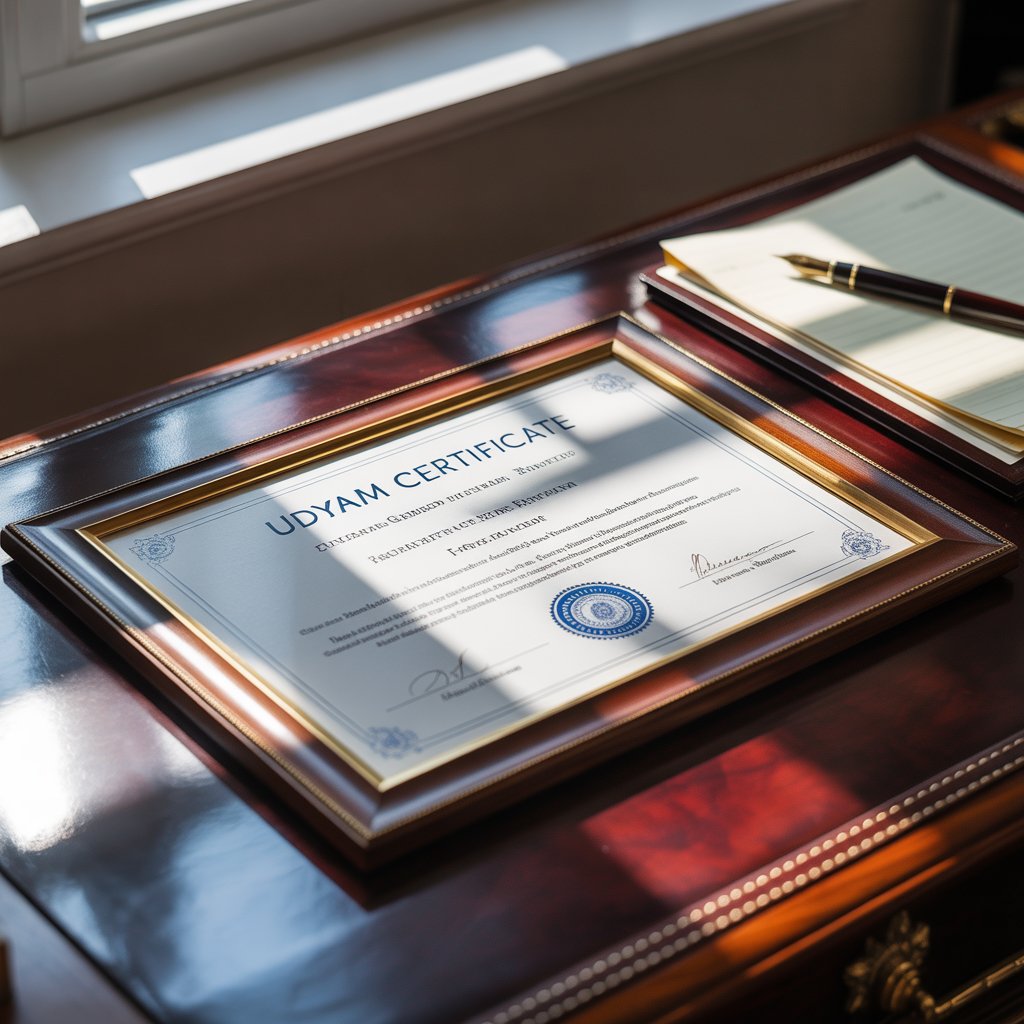Manufacturing businesses across India are discovering that Udyam registration isn’t just about compliance—it’s a powerful tool that can save thousands of rupees annually while opening doors to unprecedented growth opportunities. From small-scale production units to medium-sized manufacturing enterprises, the Udyam registration certificate has become the key to unlocking substantial cost savings and financial benefits that directly impact the bottom line.
The manufacturing sector holds a special place in India’s MSME Udyam registration framework, with investment-based classifications that recognize the unique capital requirements of manufacturing enterprises. Unlike service businesses that are classified by turnover, manufacturing businesses are categorized based on their investment in plant and machinery, making Udyam certificate benefits particularly valuable for capital-intensive manufacturing operations.
Understanding Manufacturing Classification Under Udyam Registration
Manufacturing businesses receive distinct advantages under the Udyam registration system through their investment-based classification structure. Micro manufacturing enterprises with investments up to ₹1 crore, small manufacturing businesses investing between ₹1-10 crores, and medium manufacturing enterprises with investments between ₹10-50 crores each access different tiers of benefits and cost savings opportunities.
This classification system recognizes that manufacturing businesses require substantial upfront investments in machinery, equipment, and infrastructure. The Udyam registration certificate validates these investments and provides access to specialized schemes designed specifically for manufacturing enterprises. Understanding your classification is crucial because it determines the level of benefits and cost savings available to your manufacturing business.
The beauty of Udyam certificate download for manufacturing businesses lies in its immediate applicability across multiple cost centers. From electricity bills and raw material procurement to technology upgradation and export incentives, every aspect of manufacturing operations becomes eligible for government support and cost reduction opportunities once you complete your registration process.
Electricity and Power Cost Savings: ₹50,000+ Annual Savings
One of the most significant and immediate cost savings for manufacturing businesses comes through electricity bill reductions. Industrial power consumption represents a major operational expense for manufacturing enterprises, often accounting for 15-25% of total production costs. Udyam registration provides access to industrial electricity tariffs that can reduce power costs by 20-35% compared to commercial rates.
Manufacturing businesses with MSME Udyam registration can apply for dedicated industrial electricity connections that offer substantially lower per-unit rates. A medium-sized manufacturing unit consuming 50,000 units monthly can save ₹3,000-5,000 per month through industrial tariff rates, translating to annual savings of ₹36,000-60,000. These savings increase proportionally with higher power consumption, making electricity cost reduction one of the most valuable benefits of Udyam registration certificate.
State electricity boards across India provide additional subsidies and rebates to registered manufacturing MSMEs. Many states offer special power tariff schemes during off-peak hours, demand-side management incentives, and power factor improvement rebates that can further reduce electricity costs by 10-15%. The cumulative effect of these electricity-related benefits often exceeds ₹1 lakh annually for medium-sized manufacturing operations.
The application process for industrial electricity connections becomes streamlined with Udyam verification status. Electricity boards prioritize applications from registered MSMEs and often waive or reduce connection charges, security deposits, and processing fees. Manufacturing businesses should visit their state electricity board office with Udyam certificate download documentation to initiate the industrial tariff application process immediately after registration.

Technology Upgradation Fund Scheme: ₹5-15 Lakhs in Subsidies
The Technology Upgradation Fund Scheme (TUFS) represents one of the most valuable financial benefits available to manufacturing businesses with Udyam registration. This comprehensive program provides concessional financing for technology modernization with interest subsidies of 3-5% and capital subsidies of 15-25% on eligible machinery purchases.
Manufacturing enterprises can access TUFS benefits for purchasing new machinery, upgrading existing equipment, implementing automation systems, and adopting energy-efficient technologies. A manufacturing business investing ₹20 lakhs in new machinery can receive capital subsidies of ₹3-5 lakhs and interest subsidies worth ₹2-4 lakhs over the loan tenure, resulting in total savings of ₹5-9 lakhs on technology investments.
The scheme covers a wide range of manufacturing technologies including CNC machines, automated production lines, quality testing equipment, pollution control systems, and renewable energy installations. Udyam registration certificate holders receive priority processing for TUFS applications and can access pre-approved financial institutions that offer streamlined loan processing specifically for technology upgradation projects.
Credit Linked Capital Subsidy Scheme (CLCSS) provides additional benefits for manufacturing businesses adopting modern technologies. Registered MSMEs can receive upfront capital subsidies of 15% (for general category) to 25% (for SC/ST entrepreneurs) on technology investments up to ₹1 crore. These subsidies are disbursed directly to reduce the loan principal amount, providing immediate cash flow benefits to manufacturing enterprises.
Manufacturing businesses should maintain detailed project reports, technology vendor quotations, and implementation timelines to maximize TUFS benefits. Regular interaction with MSME Development Institutes helps identify new technology schemes and funding opportunities as they become available. The key is to align technology investments with available subsidy schemes to maximize cost savings and modernization benefits.
Raw Material Procurement Savings: ₹25,000-75,000 Annually
Raw material costs typically represent 40-60% of manufacturing expenses, making procurement cost optimization crucial for profitability. Udyam registration provides access to multiple raw material procurement schemes that can reduce input costs by 8-15% through bulk purchasing arrangements, direct manufacturer sourcing, and government commodity distribution programs.
National Small Industries Corporation (NSIC) operates raw material assistance schemes specifically for MSME Udyam registration holders. These programs enable small and medium manufacturing enterprises to procure raw materials at competitive rates through collective purchasing arrangements. Manufacturing businesses can access steel, non-ferrous metals, chemicals, and other industrial inputs at prices 5-12% lower than market rates.
The Raw Material Assistance (RMA) scheme provides working capital financing specifically for raw material procurement at concessional interest rates. Manufacturing businesses can obtain raw material loans at 2-3% below market rates, with simplified documentation and faster processing for Udyam certificate holders. A manufacturing unit procuring ₹10 lakhs worth of raw materials monthly can save ₹25,000-40,000 annually through reduced financing costs alone.
Government commodity distribution schemes offer additional procurement benefits for specific manufacturing sectors. Textile manufacturers can access cotton and yarn at subsidized rates through Cotton Corporation of India schemes. Chemical manufacturers can procure basic chemicals through government trading corporations at competitive prices. Metal fabrication units can access steel and aluminum through government metal trading schemes.
Cluster development programs enable manufacturing businesses to leverage collective bargaining power for raw material procurement. Udyam registration certificate holders can join industry clusters that negotiate bulk purchase agreements with suppliers, achieving 10-20% cost reductions through volume discounts. These cluster benefits extend beyond procurement to include shared storage facilities, quality testing services, and logistics optimization.
Export Incentives and International Market Access: ₹1-3 Lakhs
Manufacturing businesses with export potential can access substantial government incentives through various export promotion schemes available exclusively to Udyam registration holders. The Merchandise Exports from India Scheme (MEIS) provides duty credit scrips worth 2-5% of export value that can be used for paying customs duties or sold in the market for cash benefits.
Export market development assistance covers 75% of expenses for international trade fair participation, buyer-seller meetings, and export marketing activities. A manufacturing business participating in international trade fairs can receive reimbursements of ₹50,000-1.5 lakhs per event, making international market development affordable and profitable.
Quality certification reimbursement schemes cover up to 75% of costs for obtaining international quality certifications like ISO 9001, ISO 14001, CE marking, and industry-specific certifications. These certifications are essential for export market access and can cost ₹2-5 lakhs independently. MSME Udyam registration makes these certifications affordable while opening doors to premium export markets.
Export financing benefits include reduced interest rates on pre-shipment and post-shipment financing for registered manufacturing MSMEs. Banks offer export credit at 1-2% below standard rates for Udyam certificate holders, resulting in significant savings on export financing costs. Additional benefits include faster export documentation processing, customs clearance priority, and reduced export compliance requirements.
Manufacturing businesses should connect with Export Promotion Councils relevant to their industry to maximize export incentive benefits. Regular participation in export training programs, buyer-seller meets, and international trade missions helps identify new export opportunities while accessing government support for international market development.
Working Capital and Cash Flow Optimization: ₹30,000-80,000 Savings
Working capital management represents a critical challenge for manufacturing businesses due to lengthy production cycles, inventory requirements, and payment collection delays. Udyam registration provides access to specialized working capital financing schemes with reduced interest rates and enhanced credit limits that can save ₹30,000-80,000 annually on financing costs.
Priority sector lending mandates ensure that banks allocate adequate credit to manufacturing MSMEs at competitive rates. Udyam registration certificate holders receive working capital loans at 1-2% below standard rates, with faster processing and reduced documentation requirements. A manufacturing business with ₹25 lakh working capital requirements can save ₹25,000-50,000 annually through reduced interest costs.
Credit Guarantee Fund Trust for Micro and Small Enterprises (CGTMSE) provides guarantee coverage for collateral-free working capital loans up to ₹2 crores. This eliminates the need for fixed asset collateral, enabling manufacturing businesses to preserve asset flexibility while accessing adequate working capital. The guarantee coverage reduces bank risk and often results in improved lending terms for registered MSMEs.
Delayed payment protection under the MSME Development Act provides legal recourse for payment collection from buyers. Manufacturing businesses can claim compound interest on payments delayed beyond 45 days, improving cash flow and reducing working capital pressure. This legal protection is particularly valuable for manufacturing enterprises supplying to large corporations or government entities.
Invoice discounting and supply chain financing schemes offer additional working capital solutions for manufacturing businesses. Banks provide invoice financing at preferential rates for Udyam verification status holders, enabling immediate cash flow against pending receivables. These facilities can bridge working capital gaps during peak production periods or seasonal demand fluctuations.
Tax Benefits and Compliance Cost Reduction: ₹20,000-50,000 Annually
Manufacturing businesses with MSME Udyam registration access various tax benefits and compliance simplifications that reduce overall tax liability and administrative costs. Income tax benefits include enhanced depreciation allowances, reduced tax rates for certain manufacturing activities, and simplified compliance procedures that can save ₹20,000-50,000 annually.
GST compliance becomes simplified for registered manufacturing MSMEs through composition scheme eligibility, quarterly return filing options, and reduced audit requirements. Small manufacturing businesses can opt for composition schemes that fix GST liability at 1-2% of turnover, significantly reducing GST compliance burden and associated costs.
Excise duty exemptions and concessions apply to specific manufacturing activities for MSME enterprises. While GST has replaced excise duties, certain manufacturing activities still benefit from duty exemptions and reduced rates. Central excise benefits continue for certain petroleum products, tobacco products, and other specified manufacturing activities.
Professional tax, labor law compliance, and regulatory filing requirements are often simplified or exempted for registered manufacturing MSMEs. Many states provide single window clearance for multiple compliance requirements, reducing professional fees and administrative costs. Environmental compliance requirements are also streamlined for small-scale manufacturing operations.
Tax planning opportunities become enhanced through various deduction schemes available to manufacturing MSMEs. Research and development expenses, employee training costs, and technology adoption expenses often qualify for enhanced deductions under various sections of the Income Tax Act. Professional tax consultants can help identify and maximize these opportunities.

Quality Certification and Brand Development: ₹75,000-2 Lakhs Savings
Quality certification represents a crucial investment for manufacturing businesses seeking to access premium markets and build brand credibility. Udyam registration provides reimbursement schemes that cover 50-75% of quality certification costs, making international standards affordable for small and medium manufacturing enterprises.
ISO 9001 quality management system certification, ISO 14001 environmental management certification, and OHSAS 18001 occupational health and safety certification become financially accessible through government reimbursement schemes. These certifications typically cost ₹1.5-3 lakhs independently but can be obtained for ₹40,000-75,000 through MSME reimbursement programs.
Product certification schemes cover costs for obtaining BIS certification, ISI marking, CE marking, and other mandatory or voluntary product certifications. Manufacturing businesses can receive reimbursements of ₹25,000-1.5 lakhs for various product certification requirements, enabling access to regulated markets and premium customer segments.
Testing and calibration equipment subsidies help manufacturing businesses establish in-house quality control capabilities. Government schemes provide 25-50% subsidies on testing equipment, calibration services, and laboratory setup costs. These investments improve product quality while reducing dependence on external testing services.
Brand development and trademark registration support includes reduced fees for trademark filing, design registration, and patent applications. Manufacturing businesses can protect their intellectual property at subsidized rates while building brand value through government-supported marketing and promotional schemes.
Manufacturing Cluster Benefits: Shared Infrastructure Savings
Manufacturing cluster development programs provide access to shared infrastructure facilities that dramatically reduce individual capital investment requirements. Udyam registration certificate holders can access common facility centers, testing laboratories, training institutes, and shared production facilities at fraction of independent setup costs.
Tool rooms and common facility centers provide access to advanced machinery, precision instruments, and specialized equipment that individual manufacturing businesses cannot afford independently. Monthly usage fees for cluster facilities are typically 60-80% lower than equipment rental costs or ownership expenses for similar capabilities.
Raw material banks within manufacturing clusters enable bulk procurement and inventory optimization for member enterprises. Cluster participants can access raw materials at 8-15% lower costs through collective purchasing power while reducing inventory carrying costs through shared storage facilities.
Technical support and training programs within clusters provide access to expert consultation, skill development, and technology transfer opportunities. Manufacturing businesses can access specialized technical knowledge and training that would cost ₹50,000-2 lakhs independently, often available at nominal costs within cluster programs.
Marketing and export promotion activities become cost-effective through cluster participation. Joint marketing initiatives, trade fair participation, and export documentation support enable small manufacturing businesses to access national and international markets at shared costs rather than individual investments.
Implementation Strategy for Maximum Savings
Manufacturing businesses should adopt a systematic approach to maximize cost savings through Udyam registration. Begin by completing the registration process on udyamregistration.gov.in and immediately downloading multiple copies of your Udyam certificate for various applications and benefit programs.

Prioritize high-impact savings opportunities like electricity tariff changes, technology upgradation schemes, and working capital optimization that provide immediate cash flow benefits. These foundational savings create financial flexibility for pursuing additional benefits and investment opportunities.
Develop relationships with MSME Development Institutes, industry associations, and cluster organizations that provide ongoing support and information about new schemes and opportunities. Regular participation in training programs and workshops helps identify emerging benefits and best practices for maximizing registration advantages.
Maintain detailed records of all savings achieved through Udyam registration benefits to track return on investment and identify additional optimization opportunities. Regular reviews of available schemes and eligibility criteria ensure that your manufacturing business captures all available benefits as policies evolve and new programs launch.
Conclusion: Transforming Manufacturing Economics Through Registration
Udyam registration represents a paradigm shift for manufacturing businesses, transforming registration from a compliance requirement into a strategic advantage that delivers substantial cost savings and growth opportunities. The combination of electricity subsidies, technology financing, raw material procurement benefits, export incentives, and working capital advantages can easily save manufacturing businesses ₹2-10 lakhs annually depending on scale and utilization.
The key to maximizing these benefits lies in understanding that MSME Udyam registration is not a one-time process but an ongoing relationship with a comprehensive support ecosystem. Manufacturing businesses that actively engage with available programs, maintain compliance requirements, and continuously explore new opportunities will find that registration becomes one of their most valuable business development investments.
For manufacturing entrepreneurs still evaluating registration benefits, consider that the cost savings outlined in this article are conservative estimates based on typical utilization patterns. Manufacturing businesses that systematically leverage all available benefits often achieve savings that exceed their annual registration maintenance costs by 50-100 times, making Udyam registration one of the highest return investments available to Indian manufacturing enterprises.
Take action today by visiting udyamregistration.gov.in to begin or verify your registration status. Your manufacturing business deserves access to every available cost reduction opportunity, and Udyam registration provides the foundation for building a more profitable, sustainable, and competitive manufacturing enterprise in India’s dynamic industrial economy.









